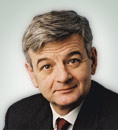The Return of Japan
TOKYO – “Japan is back!” Prime Minister Shinzo Abe declared during a visit to Washington, DC, earlier this year. But, while Japan may be on the right track after two decades of economic stagnation, there is still much to be done to secure the country’s long-term future.
In July, Abe’s Liberal Democratic Party (LDP) won control of both houses of parliament – a resounding electoral victory that amounts to the strongest political mandate any Japanese leader has received in many years. As a result, Abe seems likely to remain in power longer than his ineffectual predecessors, most of whom did not last more than a year.
Meanwhile, Japan’s economy seems to be recovering from a generation of malaise, with this year’s annualized growth rate exceeding 3%. Moreover, following the triple shock of the earthquake, tsunami, and nuclear catastrophe in 2011, Japan has managed (at considerable cost) to replace the 25% of its energy supply that the disabled reactors at the Fukushima Daiichi plant provided. The announcement that Tokyo will host the 2020 Olympic Games has also boosted public confidence.
Skeptics worry that the economic progress may not last, arguing that the high growth rate is simply a reflection of loose monetary policy and fiscal stimulus – a strategy that inflation will render unsustainable. Abe’s supporters reply that the third “arrow” of “Abenomics” – productivity-enhancing structural reforms – has only now been removed from its quiver. They point to Abe’s ability to overcome resistance from small rice farmers, part of the LDP’s electoral base, to Japan’s participation in negotiations on the Trans-Pacific Partnership, which would open Japan’s economy to increased global competition.
Nevertheless, Japan faces serious long-term challenges. First, with its birth rate well below replacement level, Japan’s population is aging and shrinking. Offsetting this trend will require increased immigration and greater female labor-force participation – neither of which will be easy to bring about. Japan has not traditionally been a country of immigration, and the World Economic Forum’s Global Gender Gap Report, which ranks 136 countries, has Japan in 105th place. But, of course, this can change – and Japan does have a history of successfully reinventing itself.
Perhaps the most critical question about Japan’s future concerns its relationship with its neighbors – North Korea, South Korea, and China. While recent polls suggest that Japan retains substantial soft power globally, this is not the case in its immediate neighborhood.
Unlike Europe, where Germany overcame World War II’s legacy through its integration into the European Union, Northeast Asia remains burdened by history. According to its neighbors, Japan’s apologies for is past aggression are inadequate. It does not help that some Korean and Chinese leaders have used anti-Japanese rhetoric to win domestic support.
In Japan, the relentless criticism has triggered a nationalist backlash, spurring politicians to respond in kind during last year’s election campaign. For example, Abe threatened to rescind the official apologies issued by former leaders or officials for abuses and atrocities committed by Japan’s army during WWII, and stated his intention to visit the controversial Yasukuni Shrine, which honors not only Japan’s war dead, but also many of its war criminals. While Abe has not acted on these campaign statements, some observers remain convinced that he will visit Yasukuni at some point, further straining Japan’s relations with South Korea and China.
Territorial disputes have exacerbated these tensions significantly. China challenges Japanese control over more than seven square kilometers of islets – called the Senkaku Islands in Japan, and the Diaoyu Islands in China – in the East China Sea. While the rival claims date back to the late nineteenth century, the latest flare-up – which has included widespread anti-Japanese demonstrations in China – was triggered in September 2012, when Japan’s government purchased three of the tiny islets from their private Japanese owner.
Then-Prime Minister Yoshihiko Noda said that he decided to purchase the islands for the Japanese central government to prevent Tokyo Governor Shintaro Ishihara from purchasing them with municipal funds. Noda feared that Ishihara, who was well known for nationalist grandstanding, would try to occupy the islands or find other ways to use them to provoke China.
But Chinese officials viewed the move as proof that Japan was trying to disrupt the status quo. Some even claimed that Japan was trying to reverse the territorial outcome of WWII.
The May 1972 transfer back to Japan of Okinawa, which the United States had administered, included the Senkaku Islands. A few months later, when China and Japan were working to normalize relations, Japanese Prime Minister Kakuei Tanaka asked Chinese Premier Zhou Enlai about the islets; Zhou responded that the dispute should be left to later generations, in order to avoid any delay of normalization.
As a result, both countries maintained their sovereignty claims. So, though Japan has administrative control, Chinese ships and planes frequently enter Japanese waters to assert China’s claim. While Japan’s security treaty with the US serves as a deterrent, there is always a danger of miscalculation.
A quick resolution of the Senkaku Islands dispute (or of Japan’s lower-profile conflict with South Korea over the Korean-controlled Liancourt Rocks) is improbable, but Japan could be more proactive. For example, by stating their willingness to take any territorial disputes to the International Court of Justice, Japanese authorities could help to dispel perceptions of militarism.
Furthermore, Japan should take the sovereign act of designating the Senkaku Islands as an international maritime preserve free of habitation or military use. China might not agree, but such a move might at least return the issue to the back burner, while reinforcing Japan’s image as a peaceful power.
Japan and Northeast Asia need bold initiatives that focus on the future. It is time to give history a rest.
Copyright: Project Syndicate, 2013.
www.project-syndicate.org
This article is brought to you by Project Syndicate that is a not for profit organization.
Project Syndicate brings original, engaging, and thought-provoking commentaries by esteemed leaders and thinkers from around the world to readers everywhere. By offering incisive perspectives on our changing world from those who are shaping its economics, politics, science, and culture, Project Syndicate has created an unrivalled venue for informed public debate. Please see: www.project-syndicate.org.
Should you want to support Project Syndicate you can do it by using the PayPal icon below. Your donation is paid to Project Syndicate in full after PayPal has deducted its transaction fee. Facts & Arts neither receives information about your donation nor a commission.





















